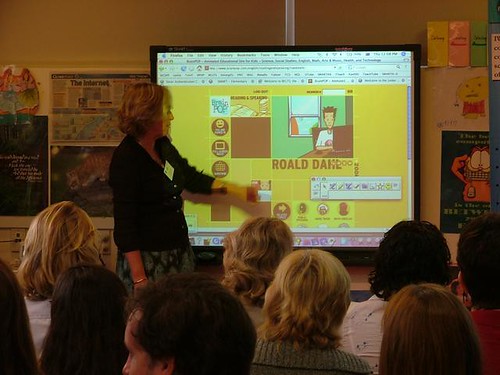 I don’t normally make requests like this but if you are reading this and you teach using any sort of Interactive Whiteboard, I have a small favour to ask…
I don’t normally make requests like this but if you are reading this and you teach using any sort of Interactive Whiteboard, I have a small favour to ask…
I am currently in the middle of writing a book about the use of IWBs in schools. I’m actually co-authoring it with Mal Lee, an ex-principal and one of the most knowledgeable guys around when it comes to interactive whiteboard research. Mal and I are trying to finish the book over the next few weeks (we have an actual book contract with the Australian Council for Educational Research… with a real deadline and everything!) It aims to be an overview guide looking at the appropriate pedagogy and logistical considerations to think about when you become an IWB user. We are trying to keep the book as brand-agnostic as possible, even though we are aware that the majority of readers will be on either a SmartBoard or an Activboard. The real focus is on pedagogy, logistics and other practical classroom considerations.
Here’s where you come in…
I would really love to include some highlights in the book with short examples from teachers all over the world about how they work with their IWBs. Mini case studies if you will. They don’t have to be long and involved, but if you teach regularly with an IWB I would love to hear from you with respect to the following questions. Don’t feel you have to answer all of them… in fact they are really just prompters to get you thinking. I’d be happy for you to write about any aspect of teaching with an IWB that you feel is relevant or important to you.
- In what ways has an IWB affected your classroom and how you teach?
- What do you see as the three biggest advantages of teaching with an IWB?
- What advice would you offer to teachers just starting out with an IWB?
- Describe the process you use when you develop teaching resources for your IWB.
- How do your students respond to the IWB?
- What is the most innovative thing you’ve ever seen done on an IWB?
Remember these are just starting points. Anything you want to write is fine. No more than 500 words please.
Since you know I’m planning to include these in the book, I will assume that if you write something then you give me permission to include your response in the book. If there are any special conditions you’d like to ask for, please let me know. I’m not in a position to pay you anything, but naturally I will give you full credit for your contribution. If you do want to write something, I’d need it within the next week.
If you’d like to help out, please send me your contributions to [email protected], or just add it as a comment at the end of this post if you’d prefer.
Many thanks.

 Here’s an interesting thought about the nature of communication through conversation…
Here’s an interesting thought about the nature of communication through conversation… If you read blogs about education with any sort of regularity you will no doubt recognise the name
If you read blogs about education with any sort of regularity you will no doubt recognise the name